I Dig UCI
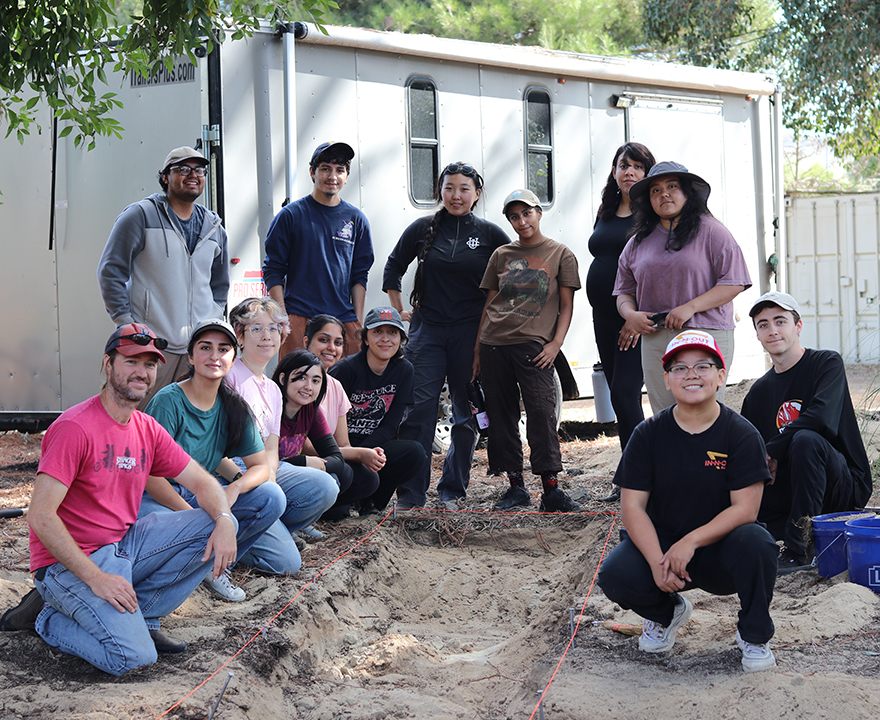
I Dig UCI
- November 14, 2023
- UCI undergrads learn more than just field methods in a hands-on archeology course in the School of Social Sciences
-----
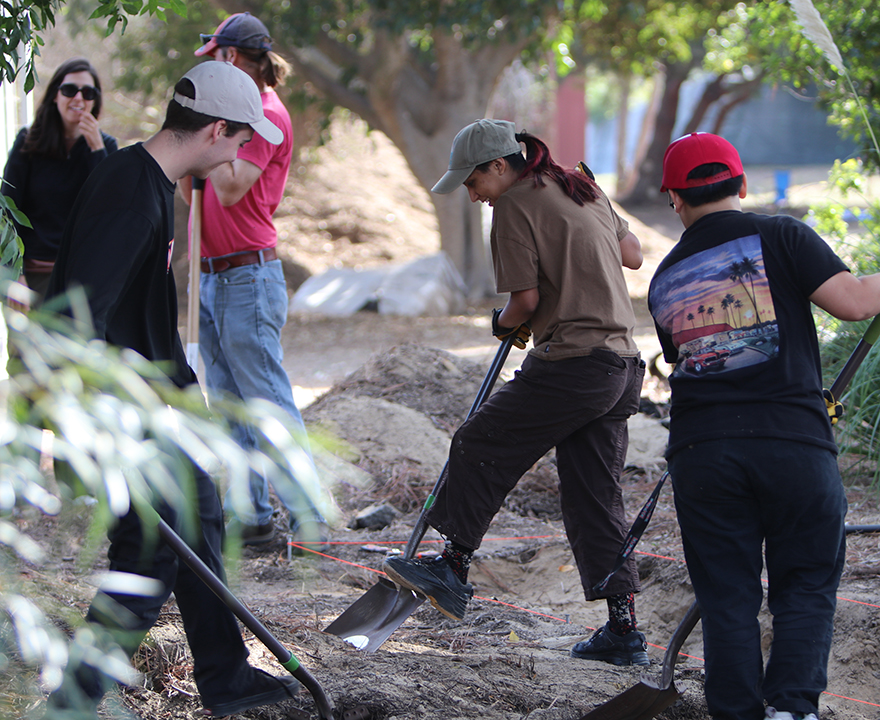 Every Saturday, upper-level undergraduate students cluster around three boarded-up
farmhouses near the ARC. They're here for Anthro 148, colloquially referred to as
“I Dig UCI.” An introduction to archaeological fieldwork, students get to learn firsthand
about research design and archaeological recovery by participating in a real excavation
of the oldest structures on campus (and some of the oldest architecture still standing
in this part of Orange County). But they end up learning a lot more than that.
Every Saturday, upper-level undergraduate students cluster around three boarded-up
farmhouses near the ARC. They're here for Anthro 148, colloquially referred to as
“I Dig UCI.” An introduction to archaeological fieldwork, students get to learn firsthand
about research design and archaeological recovery by participating in a real excavation
of the oldest structures on campus (and some of the oldest architecture still standing
in this part of Orange County). But they end up learning a lot more than that.
Ian Straughn, a seventh-year associate professor of teaching in UCI's anthropology department, is one of three teaching-series professors in UCI's anthropology department — a rarity compared to most universities, where professors are mostly focused on external research. As part of his goal to build up the profile of the archaeology program, particularly for undergraduates, he designed the 148 course, which treats the campus of UCI as an archaeological site itself.
The land on which UCI now sits was once part of the Irvine Ranch, and the buildings being excavated were known as Bonita Camp. "The existing structures are an amalgam of what was left over from the transfer of the land from the Irvine Company to the university," says Straughn. "As I train students in survey and excavation, they are then part of the team that excavates and studies the surroundings of those three farmhouses."
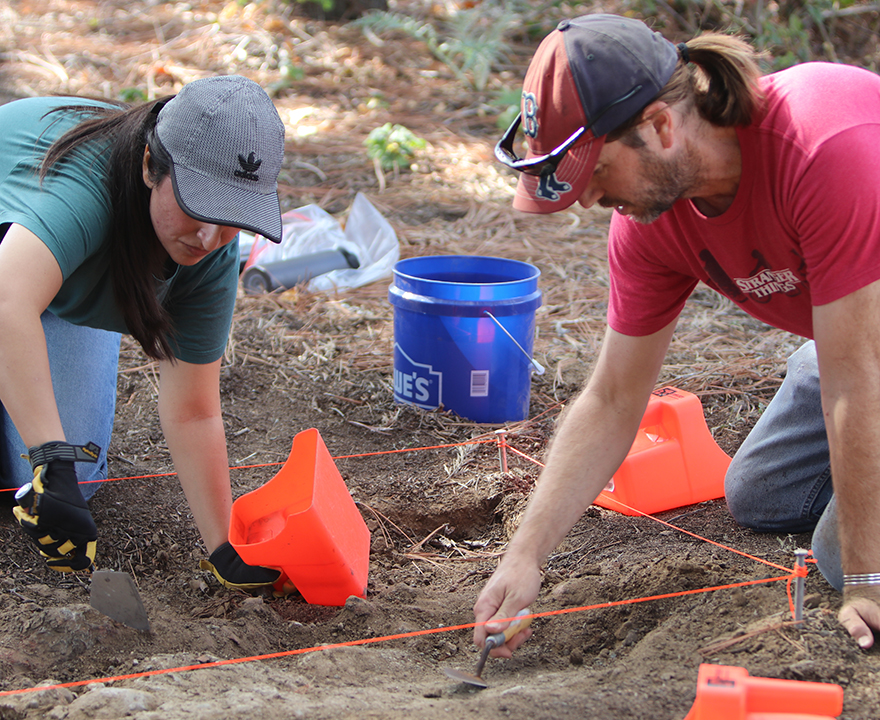 Ostensibly, it's a course in archeological field methods. "But increasingly," says
Straughn, "it's become a course that also includes the history of the development
of the university itself."
Ostensibly, it's a course in archeological field methods. "But increasingly," says
Straughn, "it's become a course that also includes the history of the development
of the university itself."
In the late 1960s and early '70s, those three buildings housed ethnographic informants, including a Samoan boatbuilder and weavers from Guatemala, on campus. It became known as the Social Sciences Farm, and it provided spaces not only for these skilled craftspeople to share their knowledge but also for students and faculty to experiment with new methods in education and research.
"That was an ethnographic project that, in some ways, turned into something much closer to a hippie commune," says Straughn. The visitors lived in the three buildings that still stand there today, while students squatted in outbuildings that later became the site for a 4H club and the Farm School, an experimental K-8 school that was run by the School of Social Sciences from 1970 to 2007. Since then, the buildings have been in a state of disuse.
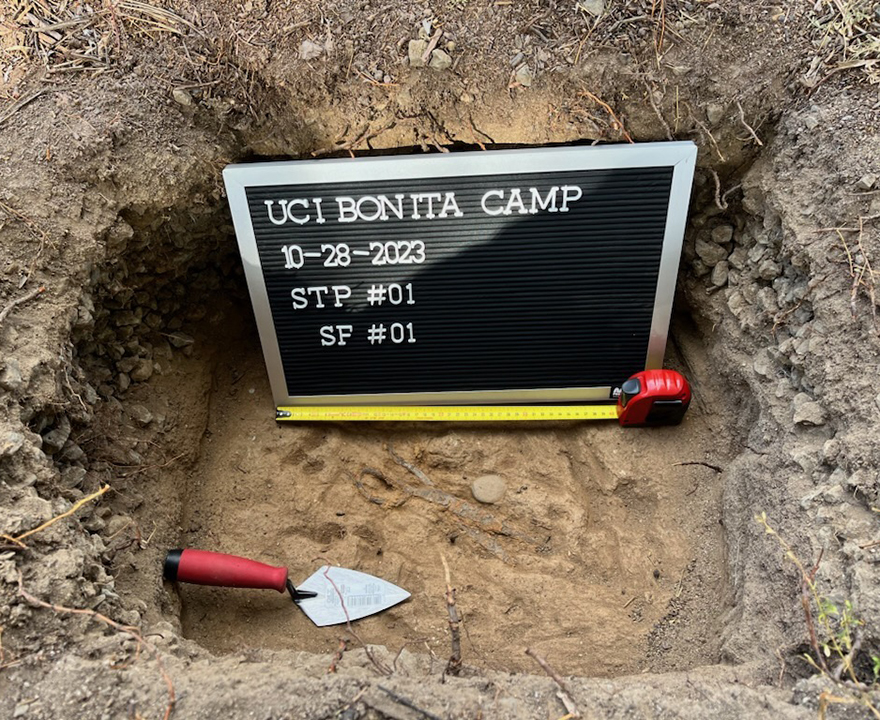 "Now they are essentially crumbling," says Straughn, who is trying to document as
much as possible before the valuable land is inevitably redeveloped. "How do we learn
as much as we can about our campus and what came before it? Through rescue salvage
archaeology."
"Now they are essentially crumbling," says Straughn, who is trying to document as
much as possible before the valuable land is inevitably redeveloped. "How do we learn
as much as we can about our campus and what came before it? Through rescue salvage
archaeology."
First offered in 2019, the course covers foundational archaeological recovery methods including surveying, mapping, sampling, documentation, excavation, and the identification and interpretation of artifacts. But it's not static. "We've been redesigning it," says Straughn, who teaches it once every other year. "It was slightly different [this year] because we learned from the previous excavation, and I've come to learn more about the campus."
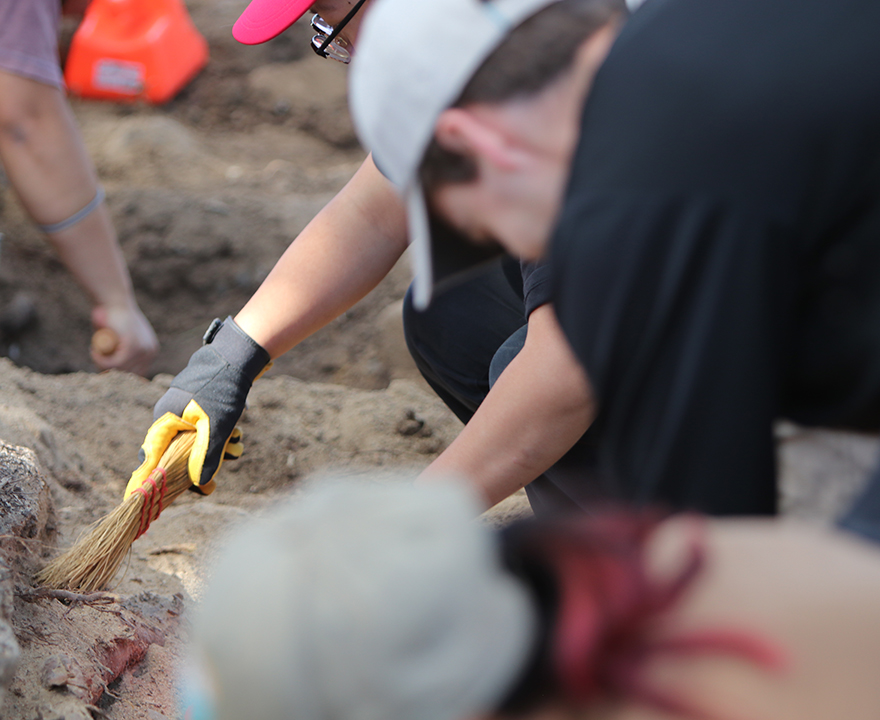 The findings from the sites number in the hundreds, if not close to a thousand, estimates
Straughn. Recovered both on the surface and through excavation work, they've yielded
some surprising insight.
The findings from the sites number in the hundreds, if not close to a thousand, estimates
Straughn. Recovered both on the surface and through excavation work, they've yielded
some surprising insight.
"There actually have been some interesting conclusions in that we see very little material culture and artifacts from the period when this was the Irvine Ranch," says Straughn. "We would expect that a working farm that had probably in the neighborhood of 30 to 60 various ranch hands, blacksmith, butchers, etcetera — a small village — they're going to produce a lot of trash. And we're not seeing any of that."
Straughn posits that waste was intentionally washed down the sloped landscape away from the sites and ultimately out into Newport Bay.
One of Straughn's goals with the course is to make archaeological fieldwork more accessible, something that he says has been a longstanding problem. Students who want to do archaeological fieldwork must often go to places like the Mediterranean or the Caribbean, where many university-led projects have summer field schools that allow students to combine international travel with site visits.
"One of the only ways that many students have to get some actual practical hands-on experience is by paying another $5,000-$6,000 which is not tenable for the vast majority of any students, let alone the really hardworking students who need to be able to do summer jobs and can't just find that kind of money," he says.
Instead, students spend their Saturdays close to home, learning and forming enduring bonds with one another. "They definitely keep in touch with each other afterwards and are often supporting each other as one goes off to graduate school, another gets an internship," says Straughn, who notes that alumni tend to come back and drop in as well.
As they look forward to potential careers in the archeology world, “I Dig UCI” helps students determine whether fieldwork is truly a good fit for them.
"They're in some ways apprentices trying to figure out what that's going to be like as they move outside the walls of the campus," Straughn says.
In the coming years, he plans to expand "I Dig UCI" beyond the course and transform it into a hub for the study, documentation, and stewardship of UCI's archaeological record. There's no better way to learn than by doing something firsthand. "They're not learning it by reading some manuals."
-Alison Van Houten for UCI Social Sciences
-pictured: “I Dig UCI” students gathered at the UCI Farm School site in October to
put course principles into practice with a day-long excavation. Look closely at the
date and time stamped picture to see one of their finds still embedded in the dirt.
-----
Would you like to get more involved with the social sciences? Email us at communications@socsci.uci.edu to connect.
Share on:
Related News Items
- Careet RightNational Financial Literacy Month
- Careet RightWhy should you keep a lucky frog in your home, according to feng shui
- Careet RightHerzfeld joins UCI anthropology as Distinguished Visitor in residence for winter quarter
- Careet RightFor immigrants, the real risks of virtual activities
- Careet RightNine from social sciences honored with Chancellor's Award of Distinction


